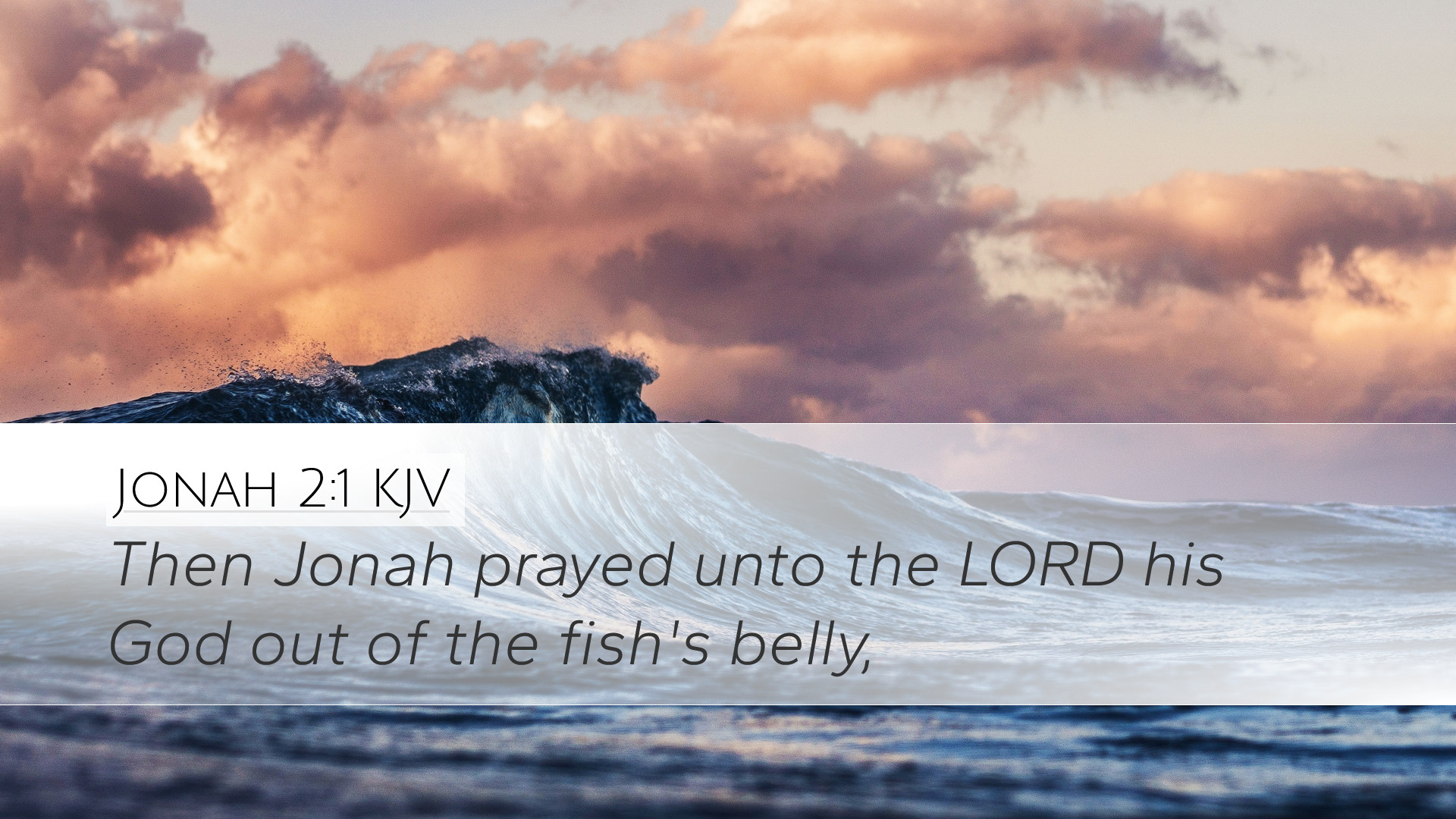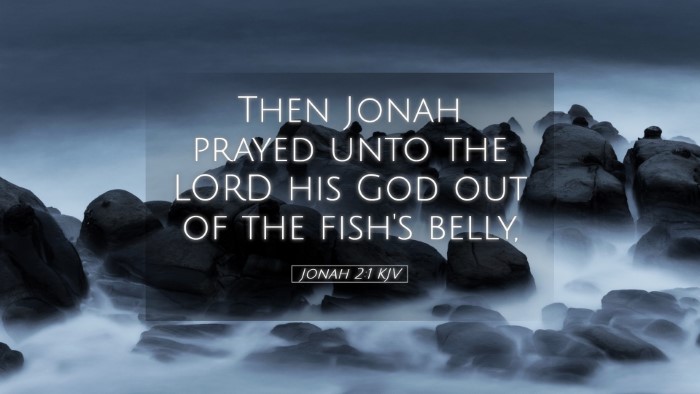Old Testament
Genesis Exodus Leviticus Numbers Deuteronomy Joshua Judges Ruth 1 Samuel 2 Samuel 1 Kings 2 Kings 1 Chronicles 2 Chronicles Ezra Nehemiah Esther Job Psalms Proverbs Ecclesiastes Song of Solomon Isaiah Jeremiah Lamentations Ezekiel Daniel Hosea Joel Amos Obadiah Jonah Micah Nahum Habakkuk Zephaniah Haggai Zechariah MalachiJonah 2:1
Jonah 2:1 KJV
Then Jonah prayed unto the LORD his God out of the fish's belly,
Jonah 2:1 Bible Commentary
Commentary on Jonah 2:1
Introduction
The Book of Jonah, a profound narrative of divine mercy and human reluctance, provides various theological insights through its dynamic storytelling. Jonah 2:1 serves as a pivotal verse wherein the prophet, swallowed by a great fish, engages in prayer reflecting his deep anguish yet unwavering faith. This commentary synthesizes insights from esteemed public domain scholars like Matthew Henry, Albert Barnes, and Adam Clarke, aiming to enrich the understanding of pastors, students, theologians, and Bible scholars.
Text of Jonah 2:1
“Then Jonah prayed to the Lord his God from the belly of the fish.” (ESV)
The Circumstances Leading to Jonah's Prayer
Distress and Recognition of Sin
Matthew Henry highlights that this verse emphasizes Jonah's desperate situation—enveloped by darkness and desperation, he acknowledges his plight. The belly of the fish symbolizes his place of isolation and potential loss, yet it also becomes a sanctuary where he can turn directly to God. Henry notes that sometimes it takes dire circumstances to bring one back to God and to recognize the need for divine assistance.
Albert Barnes’s Insight
Barnes remarks on Jonah's recognition of his failure. His previous disobedience and flight from God's command leave him with no recourse but to cry out for mercy. It is a moment that showcases human vulnerability and the pressing need for reconciliation with God. This sentiment resonates deeply with the human experience of spiritual disconnection and the corresponding call to repentance.
The Nature of Jonah's Prayer
A Prayer of Repentance and Recognition
Jonah’s prayer is profound, resembling a cry for help. Adam Clarke argues that Jonah's action signifies a heart turned back towards God. This verse shows that even in the ultimate despair, one's voice can reach heaven. Clarke notes that Jonah’s prayer signifies not only repentance but an understanding of God’s mercy. It is essential to recognize that it is within this dark, seemingly hopeless moment that Jonah reconnects with his faith—a testimony to God's omnipresence even in trials.
Theological Insights
God’s Sovereignty and Mercy
This moment illustrates God’s sovereignty over creation and mercy towards His people. Matthew Henry emphasizes that God’s ability to save is not limited by our circumstances; the fish becomes an instrument of God’s plan rather than an embodiment of punishment. This duality challenges believers to see beyond immediate tribulation and recognize God’s overarching plan for redemption.
The Importance of Prayer
Barnes accentuates the significance of prayer during times of distress. Jonah’s prayer is not just a plea; it is a critical realignment of Jonah’s heart towards God. For contemporary believers, this serves as a reminder of the importance of maintaining communication with God, especially during moments when all seems lost. Prayer emerges as a vital lifeline, reinforcing the notion that God is always accessible, regardless of our circumstances.
Application for Today’s Believers
Lessons from Jonah’s Experience
- Hope in Despair: Like Jonah, believers may find themselves in dark places. This passage reminds them that hope and connection with God can be found even in the depths of despair.
- The Power of Resilience: Jonah's ability to pray, despite his circumstances, highlights the resilience required in faith. It encourages believers to seek God actively, even when faced with challenges.
- Understanding Divine Mercy: The nature of God’s mercy, as seen in Jonah's prayer, reassures believers that no place is too far for divine grace to reach.
Conclusion
Jonah 2:1 encapsulates a moment of desperation transformed into a plea for restoration. Through the insights of Matthew Henry, Albert Barnes, and Adam Clarke, this commentary highlights the rich theological themes of repentance, divine mercy, and the importance of prayer in distress. Pastors, students, theologians, and scholars are encouraged to reflect on their own 'belly of the fish' moments and recognize the enduring opportunity for connection with God through prayer.


